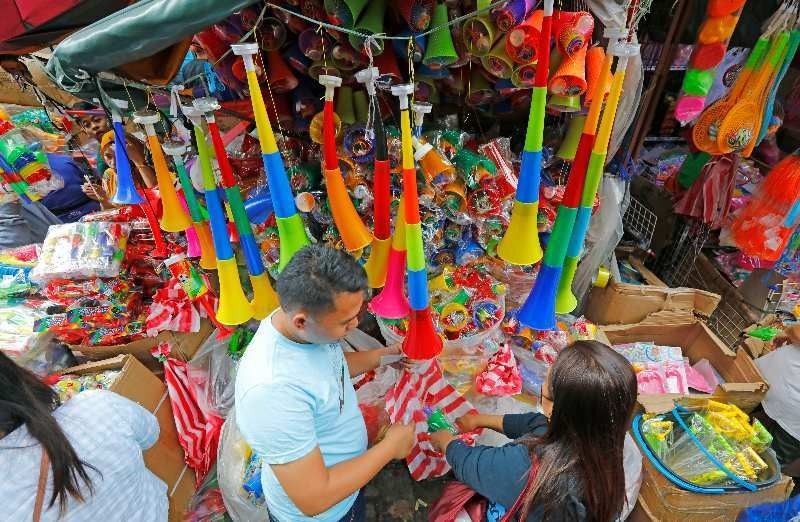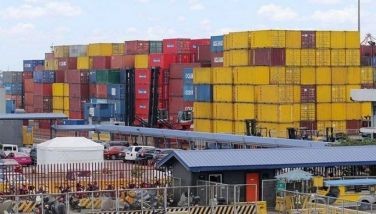Marcos admin bullish on 2022 GDP, but headwinds could spoil 2023 party

MANILA, Philippines — The Marcos Jr. administration is bullish that the Philippine economy would expand faster than its initial target last year, but analysts opined that maintaining growth in 2023 could prove challenging.
Finance Secretary Benjamin Diokno made the statement at a lunch hosted for the country’s delegation at the World Economic Forum, held at a ski resort in Davos, Switzerland. President Ferdinand Marcos Jr. pushed for the country’s attendance at the event, a debut of sorts for him despite a roiling economic crisis that left Filipinos’ purchasing power battered at the hands of inflation.
“The Philippine government expects a strong full-year gross domestic product growth for 2022, most likely much faster than its growth target of 6.5 to 7.5%,” Diokno said.
The domestic economy pulled a surprise in the third quarter of 2022. GDP eked out a 7.5% year-on-year expansion in the July-September, despite forecasts that inflation would hamper growth.
Even then, economic managers were already optimistic that the country would hit its target in 2022. Inflation proved to be a fixture last year, missing the Bangko Sentral ng Pilipinas’ target of 2-4%, averaging 5.8% as it accelerated in the middle of the year.
The rising inflation trend in the past months was partly propelled by an explosion in consumer demand, brought about by the domestic economy’s reopening in the second quarter. This, while supply problems believed to be a byproduct of the pandemic persist.
Diokno said that the 6.5% GDP target in 2023 would be one of the highest in the region. Analysts, on the other hand, were wary as powerful headwinds are expected to drag growth this year.
Headwinds ahead
Nicholas Antonio Mapa, senior economist at ING Bank in Manila, agreed with Diokno’s projection since revenge spending lifted the economy last year. But he added that 2023 will be different.
“Growth in 2023, however, will be more challenging as the triple threat of elevated prices, rising borrowing costs, and elevated debt weigh on growth prospects,” he said in a Viber message.
The BSP hiked interest rates over seven instances last year to tame consumer inflation. As it is, the central bank injected 350 basis points as interest rates currently stood at 5.5%.
Central banks, like the BSP, inject rate hikes to temper inflation within an economy. Ideally, rate hikes effectively control consumption, since higher interest rates would force consumers and businesses to think twice about borrowing money.
Even as adjustments of the benchmark rate take 12 to 18 months to seep into the domestic economy, this could crimp the country’s growth trajectory.
On the other hand, elevated debt levels put the country’s fiscal space in a precarious position. The Duterte administration’s borrowing spree to fund pandemic response bloated the debt stock.
A plump debt stock would mean more taxpayers' funds are needed for debt servicing in the coming years.
Mapa opined that a projected slowdown of the global economy could hurt the country’s growth as well. Major trading partners, such as the United States, are expecting a recession this year that could temper export appetite and consumer spending.
Jun Neri, lead economist for the Bank of the Philippine Islands, agreed with Mapa’s assessment. His team projected 2022 GDP to grow “around” 7%.
“The global growth slowdown will be another drag to growth this year and will be felt through slower remittances and exports. Hopefully, BPOs can help compensate,” Neri said in a Viber message.
The central bank forecasts BPO earnings in 2022 to grow 9% year-on-year, slightly lower compared to the 9.4% annual uptick recorded in 2021. In 2023, the annual growth of BPO earnings is projected to slow to 5%.
Despite headwinds, the Marcos Jr. administration is keen on introducing the controversial Maharlika Investment Fund to Davos attendees. The sovereign wealth fund caught public ire as public officials initially wanted to use pension funds as seed capital.
Countries like Norway and Singapore instituted sovereign wealth funds but did not face public backlash since they had a surplus of funds and high levels of trust in their leaders.
- Latest
- Trending


































